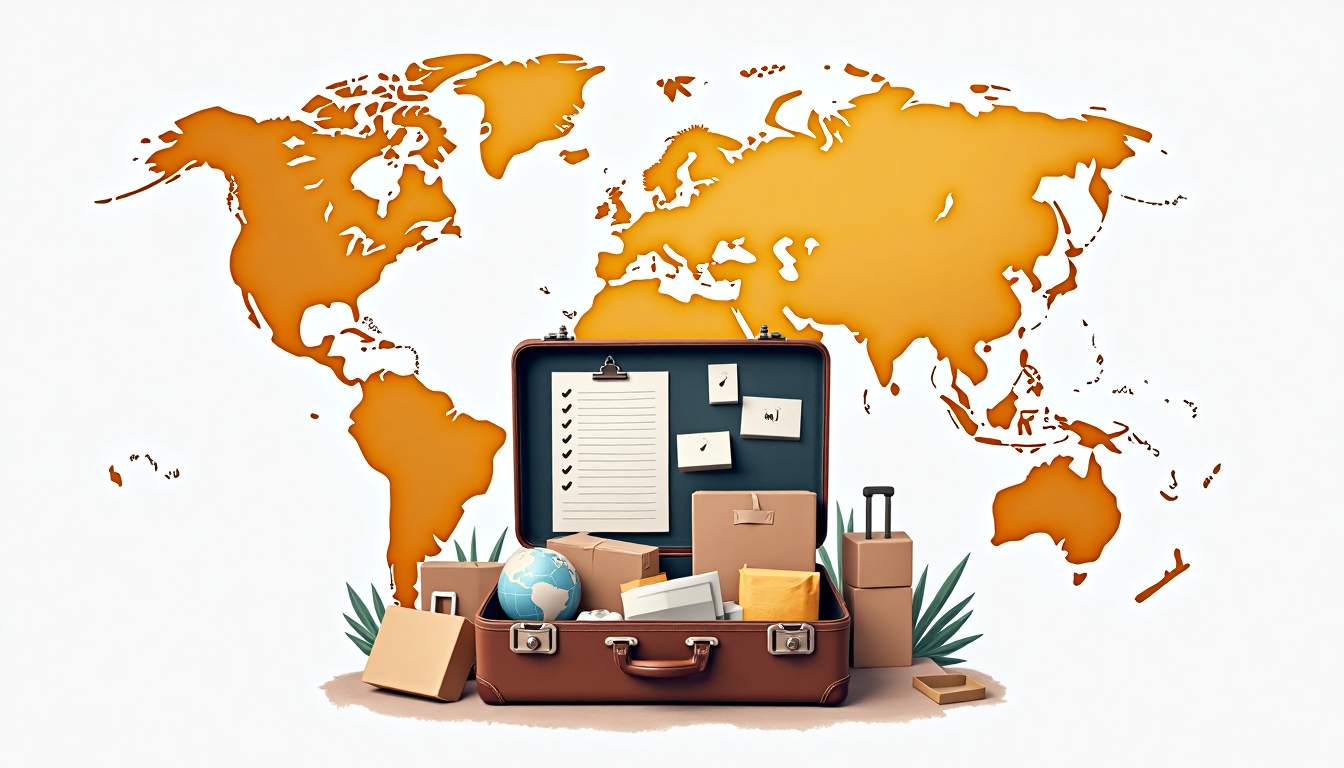Relocating to a new country is an exciting adventure, but it also comes with a unique set of challenges. From navigating customs regulations to managing your finances overseas, international moves require careful planning and organization. Whether you’re moving for work, study, or a fresh start, having a comprehensive checklist can help you avoid common pitfalls and ensure a smooth transition.
This guide covers everything you need to do before you ship your belongings abroad, from paperwork and packing to settling into your new home. With thoughtful preparation, your international move can be less stressful and more rewarding.
1. Research and Plan Your Move Thoroughly
Understand the Destination Country’s Requirements
Before you begin packing, it’s crucial to research the country you’re moving to. Each country has its own customs regulations, import restrictions, and visa requirements. For example, some countries prohibit the import of certain electronics, plants, or food items. Others may require detailed inventories of shipped goods or impose taxes and duties on household items.
Consult the official customs website of your destination country or speak with a relocation specialist to get up-to-date information. Knowing these details early will help you avoid costly delays or confiscations at customs. Additionally, it’s wise to familiarize yourself with any cultural norms or legal obligations that may affect your daily life once you arrive. Understanding local laws regarding housing, employment, and even driving can save you from potential legal issues down the line.
Set a Realistic Timeline
International moves often take longer than domestic ones. Shipping times can range from a few weeks to several months, depending on the mode of transport and distance. Start planning at least three to six months in advance to allow for visa processing, housing arrangements, and shipping logistics.
Creating a detailed timeline with milestones—such as booking your moving company, applying for visas, and scheduling utility disconnections—will keep you on track and reduce last-minute stress. It’s also beneficial to include time for unexpected delays, such as changes in shipping schedules or additional paperwork requirements. Furthermore, consider setting aside time to visit your new location, if possible, to explore neighborhoods, schools, and amenities, which can help you feel more connected and prepared for the transition ahead.
2. Organize Your Documentation
Gather Essential Documents
Moving abroad requires a variety of important documents. These include your passport, visa or residence permit, work or study permits, birth certificates, marriage certificates, and medical records. Some countries also require proof of vaccinations or health insurance coverage.
Make physical and digital copies of all documents, and keep them in a secure, easily accessible place during your move. Losing critical paperwork can cause significant delays and complications.
Prepare Shipping and Customs Paperwork
When shipping your belongings internationally, you’ll need to complete customs declarations and provide detailed inventories of your household goods. Many countries require notarized documents or specific forms that declare the value and contents of your shipment.
Work closely with your international moving company to ensure all paperwork is accurate and complete. Incorrect or missing documentation is one of the most common reasons shipments get held up at customs.
3. Choose the Right International Moving Company
Research and Compare Movers
Not all moving companies specialize in international relocations. Look for companies with a strong track record, positive customer reviews, and experience handling customs clearance. Request detailed quotes from multiple movers and compare services, insurance options, and transit times.

Beware of unusually low estimates, which may indicate hidden fees or subpar service. A reputable mover will provide a clear contract outlining all costs and responsibilities.
Consider Shipping Options
Depending on your budget and timeline, you can choose between air freight, sea freight, or a combination of both. Air freight is faster but more expensive, while sea freight is cost-effective for large shipments but takes longer.
Some movers offer consolidated shipping, where your belongings share container space with other customers, reducing costs. Discuss your priorities with your mover to select the best option for your needs.
4. Declutter and Pack Strategically
Sort and Downsize
International shipping costs are often based on volume and weight, so it pays to declutter before you pack. Donate, sell, or recycle items you no longer need. This not only saves money but also simplifies unpacking in your new home.
Keep in mind that some countries have restrictions on used furniture or electronics, so check what’s allowed before shipping these items.
Use Quality Packing Materials
Invest in sturdy boxes, bubble wrap, and packing tape to protect your belongings during transit. Label each box with its contents and destination room to make unpacking easier. For fragile or valuable items, consider professional packing services offered by your moving company.
Keep an essentials box with items you’ll need immediately upon arrival, such as important documents, chargers, basic kitchenware, and a change of clothes.
5. Manage Your Finances and Utilities
Notify Banks and Update Payment Methods
Inform your bank and credit card companies about your move to avoid account freezes due to suspicious activity. Set up international banking options if needed, and consider opening a local bank account in your destination country ahead of time.
Also, review currency exchange rates and transfer options to minimize fees when moving money abroad.
Handle Utility Disconnections and Transfers
Schedule disconnection of utilities like electricity, water, gas, internet, and cable at your current residence. If possible, arrange for services to be activated at your new home before arrival to ease the transition.
Cancel or transfer subscriptions and memberships, and update your address with service providers, insurance companies, and government agencies.
6. Prepare for Your Arrival
Arrange Temporary Accommodation
International moves can be unpredictable, and your belongings might arrive days or weeks after you do. Booking temporary accommodation such as a hotel or short-term rental ensures you have a comfortable place to stay while you settle in.
Research neighborhoods, transportation options, and local amenities in advance to choose the best location for your needs.
Understand Local Customs and Culture
Familiarizing yourself with cultural norms, language basics, and local laws can ease your adjustment period. Many expats find it helpful to join local community groups or online forums to connect with others who have made similar moves.
Learning about healthcare systems, emergency contacts, and local services will also prepare you for life in your new country.
7. Take Care of Health and Insurance Needs
Schedule Medical Checkups and Vaccinations
Visit your doctor and dentist before you leave to address any health concerns. Obtain necessary vaccinations required by your destination country, and carry an international vaccination certificate if applicable.
Bring a supply of any prescription medications along with copies of the prescriptions. Check whether your medications are legal and available in your new country.
Secure Health and Travel Insurance
International health insurance is essential to cover medical emergencies abroad. Some countries require proof of insurance for visa approval. Compare plans that offer comprehensive coverage, including evacuation and repatriation if needed.
Travel insurance can protect you against lost luggage, trip cancellations, and other unforeseen events during your move.
8. Final Checks Before You Leave
Confirm Travel Arrangements
Double-check your flight bookings, airport transfers, and any quarantine or testing requirements related to COVID-19 or other health protocols. Keep digital and printed copies of your tickets and itinerary.
Inform friends, family, and your employer of your departure date and contact information abroad.
Secure Your Home
Before leaving, ensure your current home is secure. Arrange for mail forwarding or have a trusted person collect your mail. Unplug appliances, turn off water valves if necessary, and lock all doors and windows.
Leaving your home in good condition will give you peace of mind while you embark on your new journey.
Conclusion
Moving internationally is a complex process that requires detailed preparation and organization. By following this checklist, you can minimize surprises and make your transition as smooth as possible. Remember to start early, stay informed, and seek professional help when needed.
With the right approach, shipping your life abroad can become the first step in an exciting new chapter filled with opportunities and growth.




